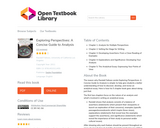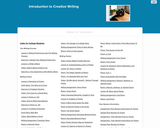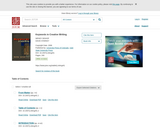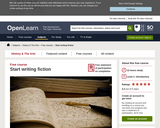
The reason why Randall Fallows wrote Exploring Perspectives: A Concise Guide to Analysis is simple: to help give students a better understanding of how to discover, develop, and revise an analytical essay. Here is how his 5 chapter book goes about doing just that:
The first two chapters focus on the nature of an analysis and what's involved in writing an analytical essay.
Randall shows that analysis consists of a balance of assertions (statements which present their viewpoints or launch an exploration of their concerns), examples (specific passages/scenes/events which inspire these views), explanations (statements that reveal how the examples support the assertions), and significance (statements which reveal the importance of their study to personal and/or cultural issues).
After showing why each feature should be present throughout an essay, he reveals how to "set the stage" for producing one of their own.
He first helps students to evaluate their own views on a subject and to examine how these views emerge from their own experiences, values and judgments.
He, then, shows them how to research what others have said about the subject and provides suggestions for evaluating and incorporating this research into their own perspectives.
Finally, Randall discusses the nature of writing, not as a linear procedure, but as a recursive process where the discovery and clarification of a concept occur simultaneously.
The remaining three chapters reveal more specific advice on how to develop an analytical essay.
Exploring Perspectives: A Concise Guide to Analysis by Randall Fallows is a great text to prepare any student to write analytical essays for the argument and persuasion courses.
Table of Contents
Chapter 1: Analysis for Multiple Perspectives
Chapter 2: Setting the Stage for Writing
Chapter 3: Developing Assertions: From a Close Reading of Examples
Chapter 4: Explanations and Significance: Developing Your Analysis
Chapter 5: The Analytical Essay: Expressing Your Points of View
- Subject:
- Composition and Rhetoric
- Creative Writing
- Literature and Composition
- Material Type:
- Textbook
- Author:
- Randall Fallows
- Date Added:
- 06/11/2020




